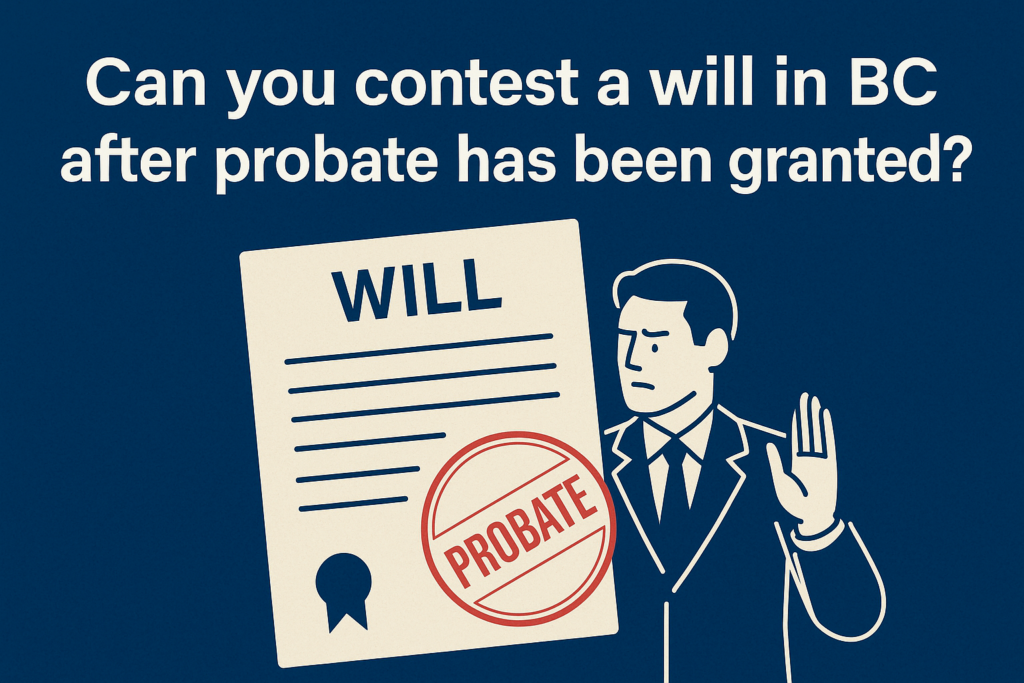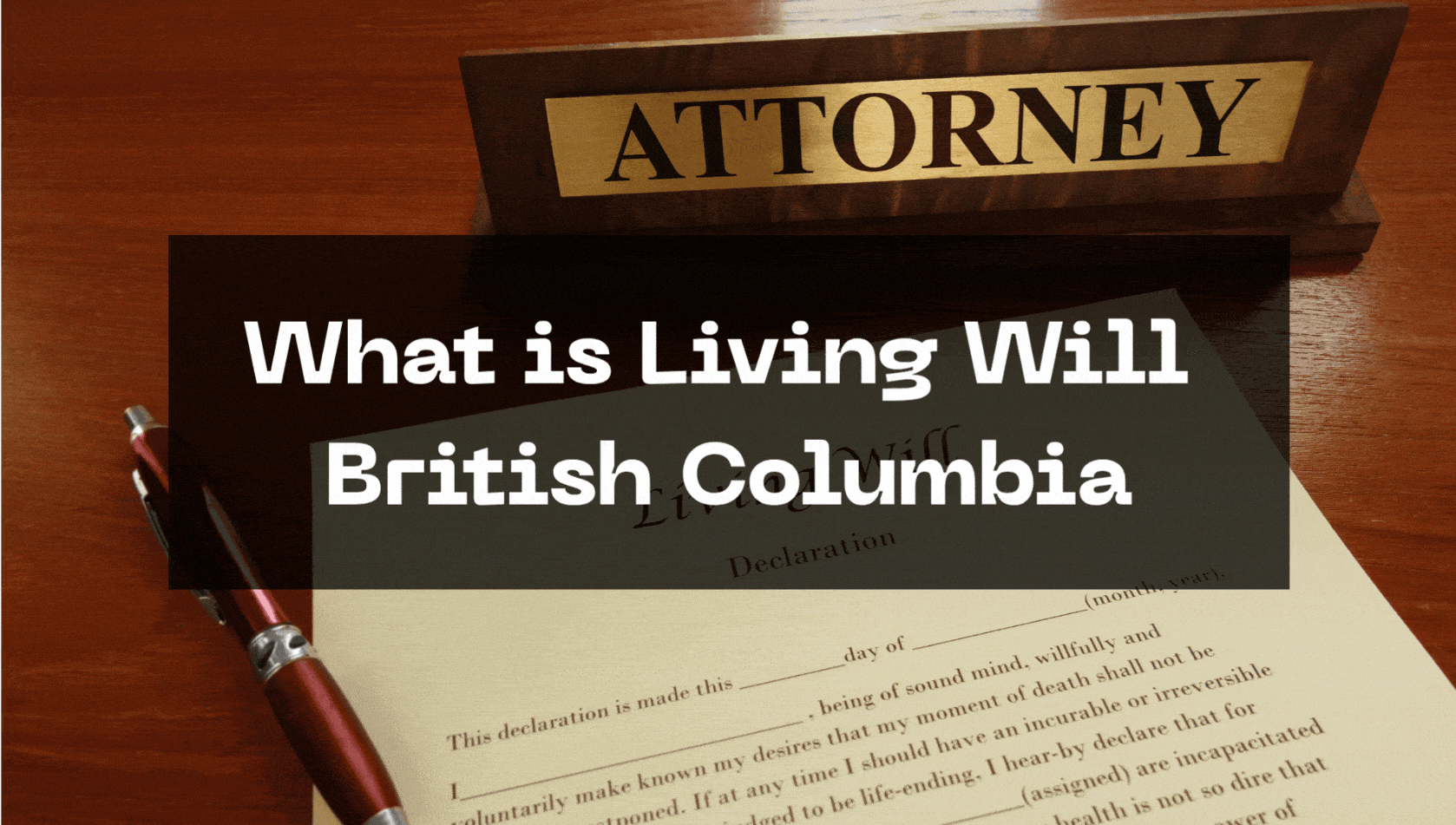Yes, it is possible to contest a will even after probate has been granted, but there are important timing considerations. Probate is the court process that validates the will and authorizes the executor to act. In BC, many will contests actually occur after probate, especially wills variation claims, because you often need the will confirmed and the executor in place to then bring the variation lawsuit. However, the key is that even if probate is granted, you must still meet the applicable contest deadlines (which we covered earlier):

✅For a Wills Variation Claim (spouse/child seeking a share):
You have 180 days from the date of the grant of probate to initiate the claim. So, if probate is granted (say) on January 1st, you have until roughly the end of June to file your Notice of Civil Claim for variation. This is explicitly allowed – the law expects that probate might be granted and then a variation claim filed within that six-month window. During that time, the executor generally should not distribute the estate (they must wait 210 days or get consents). So, contesting after probate in this scenario is normal. Once you file the claim, it effectively freezes the estate until the claim is resolved.
✅For a Will Validity Challenge (like contesting due to incapacity, etc.):
Ideally, one would file a notice of dispute before probate is granted to stop it. But if probate was granted (perhaps you weren’t aware of the issues or no one contested at that time), you can still challenge the will’s validity after probate. You would typically do so by filing a petition or initiating an action to revoke the probate. This can be done within the general 2-year limit from discovery of the issue. In effect, you’re asking the court to undo the probate (revoke the grant) because the will should be deemed invalid. The courts can and do entertain such actions, though it’s procedurally a bit more involved since an executor is already in place. If the executor has started distributing assets and you come in after probate, you’d likely seek an order to freeze any further distribution until your claim is decided. As noted, executors shouldn’t distribute within 210 days anyway if there’s a possibility of a claim, but if they didn’t know and started doing so after that period, the court can order a halt.
Practical Example:
A son wasn’t aware that his elderly mother’s will left most to a neighbour. Probate was granted to the neighbour (as executor) quickly. Two months later, the son learns of this and suspects undue influence. Even though probate is granted, he can file a petition to challenge the will. The court can put the brakes on the estate (if not already distributed) and hear the challenge. If he proves undue influence, the court can revoke the grant of probate (essentially nullifying the earlier probate as the will is invalid) and perhaps issue a new grant under a previous will or intestacy.
Does Probate being granted make the will harder to contest?
Not legally – the standards of proof or grounds needed do not change just because a probate happened. Probate is not a judgment on the merits of capacity or fairness beyond the basic validity on its face. The probate court in BC doesn’t typically examine capacity or undue influence unless someone objects. They mostly check that the will document appears valid (signed, witnessed) and required notices went out. So, a granted probate doesn’t mean those deeper issues were adjudicated. Thus, you can still raise them after.
Notice to Executor/Beneficiaries:
If you contest after probate, the executor is already in a role. You would name the executor as a defendant (in a variation, that’s standard), and also typically beneficiaries as respondents in a petition to invalidate, since their interests are affected. They will all be served and have a chance to respond in court.
Estate Already Distributed?
If probate was granted and by the time you contest the executor has fully distributed the estate (maybe you came 2 years later), you have a big problem. Even though you could technically still contest (if within limitation), getting relief is tough. The court can, in theory, order those who received assets to return them (constructive trust or restitution), but if assets are gone or recipients are not easily within reach, the victory might be pyrrhic. That’s why acting quickly is vital. There’s also a provision that an executor can’t be sued personally for distributing after 210 days if no notice of a claim was received – but they must advertise for creditors and etc. If an executor rushed distribution ignoring known potential claims, a court might hold them accountable.
Claim of Variance after Probate Complete:
Law firm guidance confirms that beneficiaries can bring a variance (variation) claim after probate is complete, within the six-month window. It’s often the case because until probate, the will isn’t officially recognised, and some people wait for probate to see if maybe matters resolve. Many executors wait 180 days (plus 30 for service) before distributing precisely because claims often come in that period. Stephens & Holman note that a will can be contested after probate and is “likely” to be granted when will provisions are unclear or when capacity is in question – that wording is a bit odd, but they seem to be saying courts will entertain claims (variance or capacity issues) after probate, especially if something looks off.
Conclusion:
In summary, contesting after probate is both allowed and common in BC, as long as you’re within the time limits. Probate being granted is not the end of the story. However, be mindful:
– For variation: Ensure you file by day 180 after probate. It’s explicitly your right to do so even if probate is done.
– For validity: Try not to delay, the sooner the better. But if you discover issues post-probate, you can still proceed (commonly within 2 years of discovery).
One extra note: Sometimes people file a “Notice of Civil Claim” for wills variation even before probate is granted (if the executor delays getting probate, a spouse/child might file at 6 months from death or so to be safe). The law, however, keys the 180 days to probate grant, so usually one waits until probate then files. For validity, if you know in advance, it’s best to file a caveat (notice of dispute) to avoid probate being granted at all until the matter is resolved.
But if the question is simply “can it be done after probate?” – yes. The probate does not shut the door on challenges, it just starts the countdown for certain types of challenges. After 6 months (with no claim) the will is more “safe” in terms of variation; after 2 years (with no issues) it’s likely safe in terms of validity.




